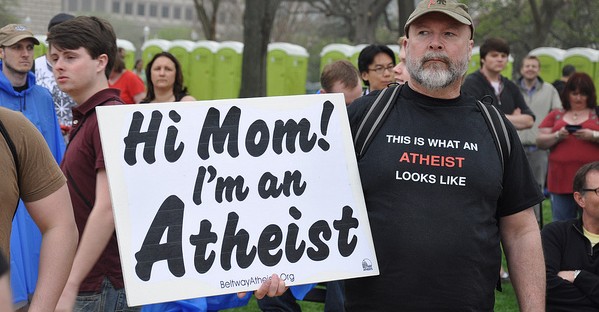
A recent study by the Pew Research Center suggests that “Nones”—people who are unaffiliated with any organized religious institution or belief system—now make up the single largest religious group in the Democratic party. Organizations like the American Atheists launched the #AtheistVoter campaign, and members of this growing voting bloc assembled at the recent Republican presidential debate in Iowa, questioning the candidates’ ability to represent non-religious Americans and demanding they “Keep Your Theocracy out of Our Democracy.” Sociologists of non-religion detail how the Nones are increasingly diverse, and their social and political agendas sometimes conflict.
The history of non-religious and atheist politics in the U.S. is one of constant tension. The non-religious take varying stances on the role of religion in social and political life, and the movement has had to balance “accommodationist” approaches to religion in the public sphere that support religion as a social good and “confrontational” approaches that position religion as a danger to democracy and progress.
- Steven Kettell. 2014. “Divided We Stand: The Politics of the Atheist Movement in the United States,” Journal of Contemporary Religion 29(3): 377-391.
- Stephen LeDrew. 2016. The Evolution of Atheism: The Politics of a Modern Movement. New York: Oxford University Press.
Tensions among the Nones can be a barrier to success as a cohesive political group, but their diversity can also be an advantage. Secular groups often define “the secular” differently depending on the context, which allows for a wider net to be cast over the variety of individual, non-religious identities. This enables more inclusive political agendas.
- Joseph Blankholm. 2014. “The Political Advantages of a Polysemous Secular,” Journal for the Scientific Study of Religion 53(4): 775-790.
- Lois Lee. 2015. “Ambivalent Atheist Identities: Power and Non-religious Culture in Contemporary Britain,” Social Analysis 59(2): 20-39.

Comments 1
Joanna Van Brunt — September 7, 2016
This is very hard for me to talk about, because I am a "religious" person myself. I am a Christian and attend a Baptist church. People who belong to non-religious groups are good people. I have no doubt about that. Just like everyone else, they are just trying to stand for their morals and to prove a point.
The scariest part for me is the fact that they make up the largest single religious group in the Democratic Party. I do not know what exactly believe. If their political views were based solely on their beliefs, I would not want to be a part of that. People always criticize Christians for pushing our beliefs into the government. In reality, every religious and people group does that, whether they want to admit it or not.
I do not see where having more of them would be an advantage for us. This country is to be united no matter their race, language, or beliefs. We are all able to get along if we allow it to happen. Each group is just wanting attention to make a point. There is nothing wrong with that. Just make sure that your motives are not there to increase only one individual group.